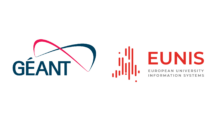Words: FCCN Marketing and Communication team
Carlos Manuel Pereira, Member of the Board of Directors of IPDJ – Portuguese Institute for Sport and Youth – explains the benefits of joining the OCRE framework agreement:
“We believe that the partnership between FCCN and IPDJ illustrates well the benefits that can come from collaborative work between public bodies, with a view to improving the provision of services to citizens.
How did the opportunity arise for IPDJ to use the OCRE framework agreement solutions?
The adhesion to the OCRE framework agreement resulted from a consultation carried out by the General Secretariat of the Presidency of the Council of Ministers on the occasion of the establishment of the framework agreement under GÉANT.
As the Portuguese Institute of Sports and Youth was aware of the need to modernise its technological infrastructure and that the trend was towards the adoption of public cloud solutions, we saw it from the beginning as an option with great potential compared to alternative scenarios such as, for example, the upgrade of the data center we had on our premises.
We had the clear perception that we should opt for a cloud solution and that joining a centralised procurement procedure like OCRE, with a European dimension and accompanied by experts with great technological competence, as is the case of the FCCN team, could help us on this challenging path.
What importance do you attribute to this possibility?
The adhesion to the OCRE framework agreement was crucial to the achievement of IPDJ’s digital transformation project in terms of implementation time, quality, and overall cost. First, the improvement of the communications infrastructure resulted in a high traffic speed, essential to the migration phase of the infrastructure to the cloud and which allows the nearly 400 workers, spread across 25 different locations in the country, to access the applications and communicate effectively and quickly. It also allowed us to access a set of very useful applications such as Colibri, Educast, b-on, the NAU Platform, Filesender, eduroam and RCTS Certificates.
What effective difference have these solutions made to IPDJ’s work?
Having as a mission the execution of public policies on sports and youth, a large part of IPDJ’s target audience is part of higher education, either as students, teachers or researchers, so we consider determinant the availability of integrated digital services, safe and able to evolve in light of the accelerated and constant innovation that we are witnessing in the field of information and communication technologies.
Currently, we have the perception that the IPDJ, with the impulse of FCCN, has taken a great technological leap and is at a level of excellence in the context of Public Administration.
How do you evaluate the role played by FCCN in this process?
From the beginning, FCCN assumed the position of a Public Administration entity at the forefront of information and communication technologies, available to share its resources with other bodies and with the ability to transmit knowledge and high-quality solutions in the national and international context. It is important to emphasise that, in addition to technological solutions, FCCN has always shown great openness to technically support the IPDJ’s workers throughout the digital transformation process.
Is there anything you would like to add?
We believe that the partnership between FCCN and IPDJ illustrates well the benefits that can arise from collaborative work between public bodies, with the perspective of improving service delivery to citizens, accelerating innovation and rationalising the use of public resources, providing high quality services at a lower cost. We hope that our experience and activity may also contribute to the success of FCCN’s mission.







